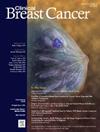通过整合 Omic 和非 Omic 数据加强乳腺癌生存预后分析
IF 2.5
3区 医学
Q2 ONCOLOGY
引用次数: 0
摘要
癌症是全球第二大死因,2020 年将有 685,000 人死于癌症,其中包括 230 万名受乳腺癌影响的妇女。癌症预后在定制治疗方案和评估疗效方面起着举足轻重的作用,因此需要全面了解癌症预后。我们的目标是开发出能够准确预测患者预后并指导个性化治疗策略的预测模型,从而推动乳腺癌精准医疗的发展。该项目通过整合全局和非全局数据,解决了当前癌症预后模型的局限性。现有模型往往忽略了 DNA 甲基化和 miRNA 等重要的全局组学数据,而该方法利用 TCGA 数据集将这些数据类型和其他数据类型整合在一起。采用 mRMR 特征选择和 CNN 模型对每种类型的数据进行特征提取,然后对特征进行堆叠,并采用随机森林分类器进行最终预后判断。将所提出的方法应用于数据集,预测患者是长期存活还是短期存活。该策略表现出色,AUC 值为 0.873,精确度为 0.881,灵敏度达到 0.943。准确率为 0.861,与之前的研究相比提高了 11.96%。总之,将多种数据与先进的机器学习相结合,有望改善乳腺癌的预后。解决模型的局限性和利用全面的数据集可以提高准确性,为更好的患者护理铺平道路。进一步的改进有望在癌症预后和治疗策略方面取得重大进展。本文章由计算机程序翻译,如有差异,请以英文原文为准。
Enhancing Breast Cancer Survival Prognosis Through Omic and Non-Omic Data Integration
Background and Objective
Cancer, the second leading cause of death globally, claimed 685,000 lives among 2.3 million women affected by breast cancer in 2020. Cancer prognosis plays a pivotal role in tailoring treatments and assessing efficacy, emphasizing the need for a comprehensive understanding. The goal is to develop predictive model capable of accurately predicting patient outcomes and guiding personalized treatment strategies, thereby advancing precision medicine in breast cancer care.
Methods
This project addresses limitations in current cancer prognosis models by integrating omics and non-omics data. While existing models often neglect crucial omics data like DNA methylation and miRNA, the method utilizes the TCGA dataset to incorporate these data types along with others. Employing mRMR feature selection and CNN models for each type of data for feature extraction, features are stacked and a Random Forest classifier is employed for final prognosis.
Result
The proposed method is applied to the dataset to predict whether the patient is a long-time or a short-time survivor. This strategy showcases excellent performance, with an AUC value of 0.873, precision at 0.881, and sensitivity reaching 0.943. With an accuracy rate of 0.861, signaling an improvement of 11.96% compared to prior studies.
Conclusion
In conclusion, integrating diverse data with advanced machine learning holds promise for improving breast cancer prognosis. Addressing model limitations and leveraging comprehensive datasets can enhance accuracy, paving the way for better patient care. Further refinement offers potential for significant advancements in cancer prognosis and treatment strategies.
求助全文
通过发布文献求助,成功后即可免费获取论文全文。
去求助
来源期刊

Clinical breast cancer
医学-肿瘤学
CiteScore
5.40
自引率
3.20%
发文量
174
审稿时长
48 days
期刊介绍:
Clinical Breast Cancer is a peer-reviewed bimonthly journal that publishes original articles describing various aspects of clinical and translational research of breast cancer. Clinical Breast Cancer is devoted to articles on detection, diagnosis, prevention, and treatment of breast cancer. The main emphasis is on recent scientific developments in all areas related to breast cancer. Specific areas of interest include clinical research reports from various therapeutic modalities, cancer genetics, drug sensitivity and resistance, novel imaging, tumor genomics, biomarkers, and chemoprevention strategies.
 求助内容:
求助内容: 应助结果提醒方式:
应助结果提醒方式:


